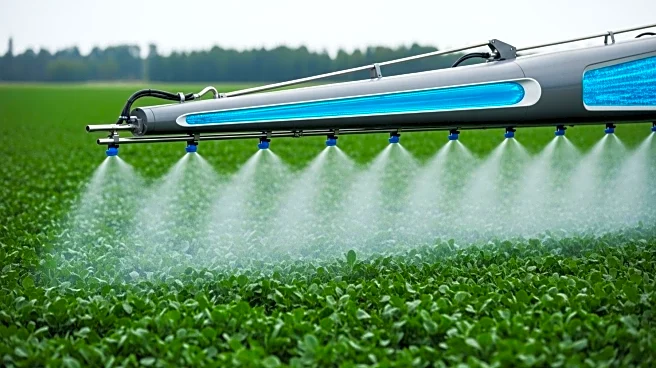What's Happening?
Bayer has announced the development of icafolin-methyl, a new herbicide designed to complement glyphosate rather than replace it. This marks the first novel mode of action for weed control in over three decades. Icafolin-methyl aims to address increasing weed resistance, a significant challenge for farmers globally, particularly in the U.S. and Brazil. The herbicide is expected to offer lower dose rates and more targeted applications, contributing to a safer and more sustainable agricultural practice. Bayer has submitted registration applications for icafolin-methyl in several regions, including the U.S., with a potential launch in Brazil by 2028.
Why It's Important?
The introduction of icafolin-methyl is significant as it addresses the growing issue of weed resistance, which threatens agricultural productivity and environmental sustainability. By complementing glyphosate, icafolin-methyl helps maintain the efficacy of existing weed control strategies, supporting no-till farming practices that offer environmental benefits such as reduced soil erosion and water retention. This development is crucial for farmers facing resistance challenges, ensuring they have effective tools to manage crops sustainably. Bayer's approach aligns with broader industry trends towards regenerative agriculture, emphasizing the need for innovative solutions in crop protection.
What's Next?
Bayer anticipates regulatory approval for icafolin-methyl by 2027, with a launch campaign planned for 2028. The company is focused on educating farmers about the benefits of icafolin-methyl, particularly its role in creating a mulch layer that prevents weed re-emergence and supports soil health. As regulatory processes advance, Bayer aims to integrate icafolin-methyl into precision agriculture practices, enhancing its application efficiency. The agricultural industry will likely monitor the herbicide's performance and adoption closely, assessing its impact on weed resistance management and environmental sustainability.
Beyond the Headlines
Icafolin-methyl's development highlights the ongoing evolution in agricultural practices, emphasizing the need for sustainable solutions that balance efficacy with environmental impact. The herbicide's ability to create a mulch layer offers potential benefits beyond weed control, such as improved soil health and reduced erosion. This aligns with global efforts to promote regenerative agriculture, which seeks to restore and enhance ecosystems through innovative farming techniques. Bayer's strategy reflects a broader industry shift towards sustainability, addressing both economic and environmental challenges in modern agriculture.











